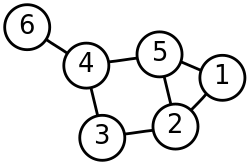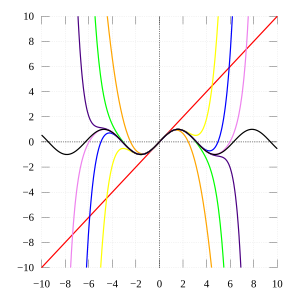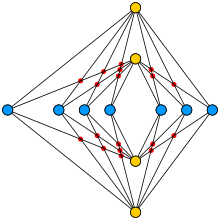Portal:Mathematics
The Mathematics Portal
Mathematics is the study of representing and reasoning about abstract objects (such as numbers, points, spaces, sets, structures, and games). Mathematics is used throughout the world as an essential tool in many fields, including natural science, engineering, medicine, and the social sciences. Applied mathematics, the branch of mathematics concerned with application of mathematical knowledge to other fields, inspires and makes use of new mathematical discoveries and sometimes leads to the development of entirely new mathematical disciplines, such as statistics and game theory. Mathematicians also engage in pure mathematics, or mathematics for its own sake, without having any application in mind. There is no clear line separating pure and applied mathematics, and practical applications for what began as pure mathematics are often discovered. (Full article...)
Featured articles –
Selected image –

Good articles –
Did you know (auto-generated) –

- ... that the prologue to The Polymath was written by Martin Kemp, a leading expert on Leonardo da Vinci?
- ... that mathematics professor Ari Nagel has fathered more than a hundred children?
- ... that the number of cannonballs in a square pyramid with cannonballs along each edge is ?
- ... that record-setting airplane spinner Catherine Cavagnaro is also a professional mathematician?
- ... that after Florida schools banned 54 mathematics books, Chaz Stevens petitioned that they also ban the Bible?
- ... that multiple mathematics competitions have made use of Sophie Germain's identity?
- ... that Arithmetic was the first mathematics text book written in the Russian language?
- ... that Donn Piatt threw his mathematics teacher out of the window?
More did you know –

- ... that, while the criss-cross algorithm visits all eight corners of the Klee–Minty cube when started at a worst corner, it visits only three more corners on average when started at a random corner?
- ...that in senary, all prime numbers other than 2 and 3 end in 1 or a 5?
- ...that, for all prime numbers p, the pth Perrin number is divisible by p?
- ...that it is impossible to trisect a general angle using only a ruler and a compass?
- ...that in a group of 23 people, there is a more than 50% chance that two people share a birthday?
- ...that the 1966 publication disproving Euler's sum of powers conjecture, proposed nearly 200 years earlier, consisted of only two sentences?
- ...the hyperbolic trigonometric functions of the natural logarithm can be represented by rational algebraic fractions?
Selected article –
Game theory is a branch of mathematics that is often used in the context of economics. It studies strategic interactions between agents. In strategic games, agents choose strategies which will maximize their return, given the strategies the other agents choose. The essential feature is that it provides a formal modelling approach to social situations in which decision makers interact with other agents. Game theory extends the simpler optimisation approach developed in neoclassical economics.
The field of game theory came into being with the 1944 classic Theory of Games and Economic Behavior by John von Neumann and Oskar Morgenstern. A major center for the development of game theory was RAND Corporation where it helped to define nuclear strategies.
Game theory has played, and continues to play a large role in the social sciences, and is now also used in many diverse academic fields. Beginning in the 1970s, game theory has been applied to animal behaviour, including evolutionary theory. Many games, especially the prisoner's dilemma, are used to illustrate ideas in political science and ethics. Game theory has recently drawn attention from computer scientists because of its use in artificial intelligence and cybernetics. (Full article...)
| View all selected articles |
Subcategories

Algebra | Arithmetic | Analysis | Complex analysis | Applied mathematics | Calculus | Category theory | Chaos theory | Combinatorics | Dynamical systems | Fractals | Game theory | Geometry | Algebraic geometry | Graph theory | Group theory | Linear algebra | Mathematical logic | Model theory | Multi-dimensional geometry | Number theory | Numerical analysis | Optimization | Order theory | Probability and statistics | Set theory | Statistics | Topology | Algebraic topology | Trigonometry | Linear programming
Mathematics | History of mathematics | Mathematicians | Awards | Education | Literature | Notation | Organizations | Theorems | Proofs | Unsolved problems
Topics in mathematics
| General | Foundations | Number theory | Discrete mathematics |
|---|---|---|---|
| |||
| Algebra | Analysis | Geometry and topology | Applied mathematics |
Index of mathematics articles
| ARTICLE INDEX: | |
| MATHEMATICIANS: |
Related portals
WikiProjects
![]() The Mathematics WikiProject is the center for mathematics-related editing on Wikipedia. Join the discussion on the project's talk page.
The Mathematics WikiProject is the center for mathematics-related editing on Wikipedia. Join the discussion on the project's talk page.
In other Wikimedia projects
The following Wikimedia Foundation sister projects provide more on this subject:
-
Commons
Free media repository -
Wikibooks
Free textbooks and manuals -
Wikidata
Free knowledge base -
Wikinews
Free-content news -
Wikiquote
Collection of quotations -
Wikisource
Free-content library -
Wikiversity
Free learning tools -
Wiktionary
Dictionary and thesaurus























































